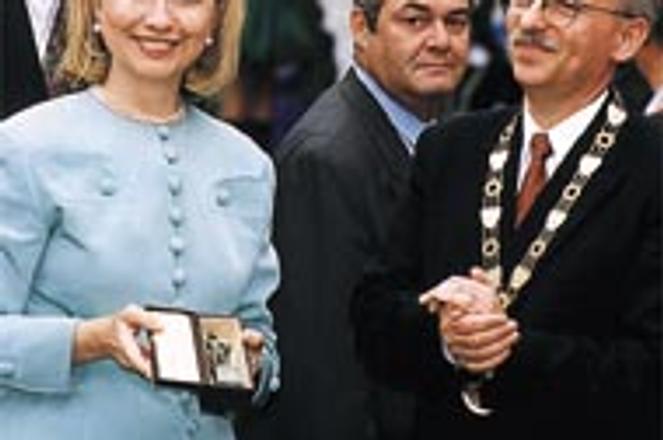It was smiles all around as U.S. First Lady Hillary Clinton toured Bratislava flanked by the city's mayor, Peter Kresánek.Ramon Leško
American First Lady Hillary Clinton may have been in the spotlight, but it was U.S. Ambassador to the U.N. Madeleine Albright that voiced heightened U.S. concern with Slovakia's democratic development in a whirlwind seven-hour tour of Bratislava on July 6.
While Clinton's calls on President Michal Kováč and Prime Minister Vladimír Mečiar were not to press U.S. policy, Albright's were, and they clearly showed that the White House had made a conscious decision to delineate specific U.S. concerns.
After the hour-long session with Mečiar and other senior government officials, Albright enumerated what they were: the amendment to the Penal Code (known also as the Protection of the Republic bill), bills related to the media and universities, and the newly-passed law on foundations. "Mr. Mečiar was answering my questions," Albright said afterwards. "I just hope that he heard me."
One group that was surely listening was the representatives of 20 non-governmental organizations (NGOs) who gathered in the Reduta symphony hall in Bratislava's Old Town to hear the First Lady chair a roundtable discussion on one of her favorite topics: the non-profit sector. Many officials from Slovakia's third sector weighed in with their concerns about the law on foundations and its chilling effect on the future of the third sector.
"Are we moving toward supporting real volunteerism and charitable altruistic behavior? Or will we come back to 'obligatory volunteerism' and centralized models of state-governed care?" asked Dušan Ondrušek, Director of Partners for Democratic Change Slovakia.
"The third-sector slang sometimes labels different NGOs with funny abbreviations like MINGO (members interested in NGOs), or PINGO (public interested NGO) or GONGO (governmentally organized NGO) or QUANGO (quasi NGO). So the question is: will the GONGOs and QUANGOs push back the MINGOs and PINGOs?"
Clinton, renowned for her somewhat icy countenance, cracked up over Ondrušek's analysis. However, the seriousness of her concerns for seeing the third sector nurtured - and the third sector's relationship to the development of democracy - was undeniable.
"Very often, people who are working hard and doing what they think is right for the country don't want the necessary criticism that comes with democracy," Clinton said. "Any government that wants to make sure that democracy lives...must understand that the NGO is a partner in that process."
Comments such as those pleased officials like Pavol Demeš, director of Kováč's foreign policy department, who described Clinton as "an ambassador of justice, peace and harmony" in his closing remarks at the NGO discussion. Demeš, who is himself heavily involved in the third sector's fight against the foundation law, said the fact that Clinton spent one and a half hours of her brief sojourn to discuss the NGO issue shows that the meeting was a success.
The First Lady was also able to satisfy herself on another personal core issue - women's rights - which she discussed privately with Emilia Kováčová, President Kováč's wife, who greeted the First Lady and Ambassador Albright at the airport. While Albright and Clinton arrived together for the meeting with senior Slovak government officials, Clinton signed the guest book and slipped out for a walkabout in downtown Bratislava, where she said she enjoyed meeting some of the growing American expat community.
Albright and Clinton also met with Bratislava Mayor Peter Kresánek and Comenius University Rector Juraj Švec. Clinton's said in her farewell remarks that her only regret was that the visit "was too short." They had spent more than three days in the Czech Republic.


